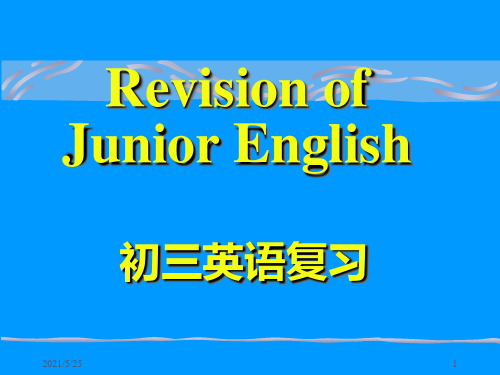初中英语基础语法完整ppt课件
合集下载
英语语法基础-PPT

It is too difficult a test for us beginners.
He didn’t kown how great a mistake he had made. C)quite,rather与单数名词连用,冠词位于其后,但若 rather,quite前有形容词修饰,则不定冠词置于前后均可,如:
It was rather a disaster. He is rather an unplearant person.=He is a rather unpleasant person.
❖ 2,定冠词的位置
❖ 通常位于名词或名词修饰语之前,但若遇上 all,both,double,half,twice,three times等词的时候,定冠词置于其中。如:
consider one’s feelings make friends with 与某人交朋友 take measures to do sth 采取措施做某事 make repairs 修理 make matters better使情况好转
第二章冠词
❖ 分类:不定冠词,定冠词,零冠词 ❖ 冠词的位置: ❖ 1、不定冠词的位置A)若遇上such,what,many,half等词,不
❖ If I were her ,I would leave. ❖ 注:单独使用的人称代词通常用宾格。如:
❖ “I want to leave.” “Me too.”
❖ “Who did this?” “Me.” ❖ B)人称代词的排列顺序。对于单数人称代词,其排列通常为“二、三、一”
即you,he and me.而对于复数人称代词,则其排列通常为“一、二、三” 即we,you and they.如:
❖ i)用于某些习语
He didn’t kown how great a mistake he had made. C)quite,rather与单数名词连用,冠词位于其后,但若 rather,quite前有形容词修饰,则不定冠词置于前后均可,如:
It was rather a disaster. He is rather an unplearant person.=He is a rather unpleasant person.
❖ 2,定冠词的位置
❖ 通常位于名词或名词修饰语之前,但若遇上 all,both,double,half,twice,three times等词的时候,定冠词置于其中。如:
consider one’s feelings make friends with 与某人交朋友 take measures to do sth 采取措施做某事 make repairs 修理 make matters better使情况好转
第二章冠词
❖ 分类:不定冠词,定冠词,零冠词 ❖ 冠词的位置: ❖ 1、不定冠词的位置A)若遇上such,what,many,half等词,不
❖ If I were her ,I would leave. ❖ 注:单独使用的人称代词通常用宾格。如:
❖ “I want to leave.” “Me too.”
❖ “Who did this?” “Me.” ❖ B)人称代词的排列顺序。对于单数人称代词,其排列通常为“二、三、一”
即you,he and me.而对于复数人称代词,则其排列通常为“一、二、三” 即we,you and they.如:
❖ i)用于某些习语
初中英语语法大全课件

(1)构成名词的后缀常用的有-ence,-(e)r/ -or (从事某事的人),-ese (某地人),-ess (雌性),-ful (一……),-ian (精通……的人),-ist (专业人员),-ment (性质;状态),-ness (性质;状态),-tion(动作;过程)等。例如: differ不同于→difference区别 write写→writer作家 Japan日本→Japanese日本人 act表演→actress女演员 mouth口→mouthful一口 music音乐→musician音乐家 racial种族的----racialist种族主义者
01
合成形容词
02
名词+形容词snow-white雪白的
03
名词+现在分词English-speaking讲英语的
04
名词+to+名词face-to-face面对面的
05
名词+过去分词man-made人造的
06
数词+名词one-way单行的
07
数词+名词+形容词two-year-old两岁的
动词转化为名词
很多动词可以转化为名词,大多意思没有多大的变化(如下①);有时意思有一定变化(如下②);有的与一个动词和不定冠词构成短语,表示一个动作(如下③)。例如:
Let's go out for a walk.我们到外面去散散步吧。
He is a man of strong build.他是一个体格健壮的汉子。
构成副词的常用后缀有-ly (主要用于形容词之后表示方式或程度),-ward(s) (主要用于表示方位的词之后表示方向)。
例如:
angry生气的→angrily生气地
to到→towards朝……,向……
初中英语语法课件ppt

03
Opposite Meanings Adjectives
When using Opposite Meanings Adjectives, place the stronger
one first For example, "big and small."
The Usage of Advantageous
The use of connections
Coordinating Connections
Connections like "and", "but", "or" are used to coordinate two or more independent clauses, e.g., "I like apples, but my brother doesn't"
Subordinating Connections
Connections like "because", "if", "when" are used to introduce sub border clauses, e.g., "I will go to the park because it's sunny today"
Last Simple Tense
Used to express an action that occurred in the past Example: "She walked to school yesterday."
The tense of verbs
Present Continuous Tense
初一英语英语语法总结(共51张PPT)

一、名词
个体名词
普通名词
具体名词
集体名词
名
专有名词
词 抽象名词
单数
名 可数名词 复数 词
不可数名词
英语语法中,名词有两种数的形式: 1)单数(表示一个人或事物); 2)复数(表示多于一个的人或数)。 只有可数名词才有复数形式。
名词的数:
名词复数形式的构成
形式
变化规则
发音
例词
一般情况
+s
1. 清辅音结尾的名词后[s] 2. 浊辅音结尾的名词后[z]; 3. 元音结尾的名词后[z];
2. 在某些度量表示法中: We have PE lessons three times a week.
3. 用在单数的表语名词前,以表示职业、行业、宗教、等级等。 George wants to be an engineer.
4. 在以what引导的感叹句中,单数的可数名词前。 What a pretty girl!
Be动词
am, is, are was, were
been
is 1. He ________ very good at English.
Practise
are 2. My father and I ________ going to Beijing next month. Were 3. ________ you on duty the day before yesterday?
3. 用在后面跟有限定性介词短语的名词前。 the letter from America, the fourteenth of April
4. 用在泛指的乐器名词前。 He plays the piano.
5. 一些常用短语。 by the way, in the morning, What’s the matter?
初中英语零基础学语法--英语句子结构 课件(共43张PPT)

附属成分
基本成分的修饰语。可以是: • 定语:即用来修饰名词的单词、短语或从句 • 状语:即用来修饰名词或代词以外的词的单词、短语或从句。
定语
Poor John tottered toward a hospital nearby. She likes oranges imported from the USA.
省略成分
句中被省略的成分,虽然未说出来,却在句中表示 一定的意思:
(You) Come here. (I wish you)Good luck! Some gave him praises,but others(gave him)rotten eggs.
He runs as fast as, if ( he does ) not ( run ) faster, than you. ( I ) Hope you like it. John should clean the room today and Peter ( should clean it ) tomorrow.
主语、动词(不及物动词、及物动词、双宾动词、系动词、宾 补动词)、宾语及补语可以称为基本句子成分。完整的句子一 般至少包含2个基本成分,至多4个基本成分。
Vi(不及物动词)
主 语
谓 语
Vt(及物动词)
宾语 宾语(直) 宾语(间) 宾语 宾补
系动词
表语
be / feel / seem / look appear / stand / lie become /get / grow / turn go / come / remain/ keep taste / smell etc.
连接成分
连接成分实际上是一个连词,用来连接两个或几个平行的词、
初中英语语法讲解PPT课件

双重所有格(of+’s的两种结合)
• P11-13 (textbook) • 做练习 • 作业 列出有关名词一讲疑惑不解或易错的5- 10个难点.
第二讲 冠词和数词
•
冠词是虚词,本身不能单独使用,也没有词义,它用在名词的前面,帮助指明名词 的含义。英语中的冠词有三种,一种是定冠词(the Definite Article),另一种是不定 冠词(the Indefinite Article),还有一种是零冠词(Zero Article)。 2.1不定冠词的用法 不定冠词a (an)与数词one 同源,是"一个"的意思。a用于辅音音素前,一般读作 [e],而an则用于元音音素前,一般读做[en]。 1) 表示"一个",意为one;指某人或某物,意为a certain。 A Mr. Ling is waiting for you.
2) 以o 结尾的名词,变复数时: a. 加s,如: photo---photos piano---pianos radio---radios zoo---zoos; b. 加es,如:potato--potatoes tomato--tomatoes c. 均可,如:zero---zeros / zeroes 3) 以f或fe 结尾的名词变复数时: a. 加s,如: belief---beliefs roof---roofs safe---safes gulf---gulfs; b. 去f,fe 加ves,如:half---halves knife---knives leaf---leaves wolf---wolves wife---wives life---lives thief---thieves; c. 均可,如: handkerchief: handkerchiefs / handkerchieves
初中英语语法课件ppt

vacation together.
过去将来时的使用:
一、过去将来时表示对于过去某一时间而言将要发生的动 作或存在的状态。 would或was /were going to + V
would可用于各种人称。
二、would +V还可表示过去的习惯动作,在这点上同used to同义。
When we were children, we would/used to go swimming every summer.
e) 用于条件从句“如果……想,设想”(接近if ……want to,或 if ……should) 例:Greater efforts to increase agricultural production must be made if food shortage ____________ avoided. A) is to be B) can be C) will be D) has been
一般现在时的动词形式: 动词原形 1.am;is ;are 2.have,has 3.第三人称单数形式-(e)s
肯定句:I watch television every day.
否定句:I don’t watch television every day.
疑问句:Do you watch television every day.
一般现在时的使用:
1.一般现在时表示总是、通常、习惯 性的动作或状态。
It snows in winter. I watch television every day.
2.用于对客观事实的普遍性的陈述。
Water consists of hydrogen and oxygen. Most animals kill only for food. The world is round.
过去将来时的使用:
一、过去将来时表示对于过去某一时间而言将要发生的动 作或存在的状态。 would或was /were going to + V
would可用于各种人称。
二、would +V还可表示过去的习惯动作,在这点上同used to同义。
When we were children, we would/used to go swimming every summer.
e) 用于条件从句“如果……想,设想”(接近if ……want to,或 if ……should) 例:Greater efforts to increase agricultural production must be made if food shortage ____________ avoided. A) is to be B) can be C) will be D) has been
一般现在时的动词形式: 动词原形 1.am;is ;are 2.have,has 3.第三人称单数形式-(e)s
肯定句:I watch television every day.
否定句:I don’t watch television every day.
疑问句:Do you watch television every day.
一般现在时的使用:
1.一般现在时表示总是、通常、习惯 性的动作或状态。
It snows in winter. I watch television every day.
2.用于对客观事实的普遍性的陈述。
Water consists of hydrogen and oxygen. Most animals kill only for food. The world is round.
初中英语语法专题课件完整版(共983张PPT)

2.不规则变化
构成方法
例词
形式不变 (单复数同形)
sheep-sheep deer-deer Chinese-Chinese Japanese-Japanese
变内部元音字母
foot-feet tooth-teeth goose-geese man-men mouse-mice
词尾加-en/-ren
a group of 一队,一组,一群
②还可用much,little,a little of,a large amount/deal of, no,plenty of等来修饰不可数名词,some,any既可修饰可数名词也可修 饰不可数名词。
much money,plenty of water a little of air some(肯定句): some milk ,some apples any(疑/否):Are there any stamps?I don’t have any money (5)数词-名词-形容词构成的复合形容词,中间的名词不能用
普通名词又可分为下面四类:
1)个体名词:表示单个人或单个事物。 如:gun、kid 、book。 2)集体名词:表示一群人或一些事物组成的集合体。 如:family。
3)物质名词:表示无法分为个体的物质、材料、食品、饮料、液体、气体、 金属等名称的名词,
如:pork、wood、bread、water、air。 4)抽象名词:表示动作、状态、品质、感情等抽象概念及学科、疾病。 如:work 。Hunger、honesty 、love、Chinese、success、HIV。 个体名词和集体名词可以用数目来计算,称为可数名词。
f,fe 为v,再加 -es
shelf-shelves thief-thieves
《初中英语语法》PPT课件

We know (that)we should learn from each other. Please tell me if/whether you have been to America. Could you please tell me where the restrooms are? 引导词是从句的一个成份,所以用哪个引导 词,看从句成份是 否完整,不完整,一定是特殊疑问句。完整,判断主句语气, 是疑问语气,用if/whether; 是肯定语气,用that.
2:用that, if/whether, how,where,what,….等连接词填 空.
that they will visit our school next week. 1.I hear_____
who the girl is? 2.Do you know_____ how can get to the park? 3.Could you tell me _____I 4.We thought ______you had never been there before . that 5.Please tell me_______ you live. where 6.Mother asked me ___________ I had finished my if/whether homework.
why 7.Do you know_____ she is angry? what 8.The teacher asked_____ your name was. how old
9.Tom is ten.I want to know _________ you whether are.
10.He asked you_______ you were a student or not.
初中英语语法大全-PPT

9.(2011·上海)These natural disasters have warned us that everyone should start to protect the ________immediately. A.amusement B.development C.environment D.government 【解析】本题考查名词词义辨析。amusement“娱乐”;development“发 展”;environment“环境”;government“政府”。句意为“这些自然 灾害已经告诫我们每个人应立刻开始保护环境。” 【答案】C
【答案】A
6.(2011·南京)—Mrs Black, could you give me some advice on how to write an application letter? —With pleasure.Remember that the letter should be written in the formal ________. A.value B.style C.effect D.mood 【解析】本题考查名词词义辨析。value“益处,价值”;style“风格, 文体”;effect“影响,效果”;mood“情绪,心情”。由语境知“写申 请信应用正式文体”。 【答案】B
10.(2011·黄冈)—Mrs.Wang was sent to teach English in a poor mountain village last year. —She said she would never forget some pleasant ________ while working there. A.experiments B.expressions C.experiences D.emotions 【解析】本题考查名词词义辨析。experiment“实验”;expression“表 达”;experience“经历”;emotion“感情”。空格所在句的句意为“ 她说她永远也不会忘记在那工作时的一些美好的经历。”故选C。 【答案】C
初中英语语法大全PPT优秀课件

7)掌握几种同义句转换
1. He is taller than any other student in his class.
= He is taller than the other students in his class.
= He is taller than any of the other students in his class.
* They haven’t come back yet.
★ such 修饰名词 so 修饰形容词、副词
*I have never seen such an
interesting film.
*This box is so heavy that I can’t
carry it.
2021/5/25
3
★ alone(单独、独自)作表语=by oneself lonely(孤独的)可作表语、定语
2021/5/25
28
用词的适当形式填空
1 He works very __h_a_r_d_____. He _h__a_r_d_l_y___
has a rest on Sunday. (hard)
2 __L_u_c_k__il_y__, he didn’t fail in the exam.(luck)
A. the latest B. later
C. early
D. as late
(B )2 The more we looked at the picture, ____.
A. we like it less B. the less we liked it
C. better we liked it D. it looked better
最新初中英语语法知识汇总PPT精品课件

(3) It is + 不及物动词 + 从句 It seems that… It happened that… It appears that…
(4) It + 过去分词 + 从句 It is reported that… It has been proved that… It is said that…
表语从句在复合句中作表语的名词性从句,放在系动 词之后,一般结构是“主语+连系动词+表语从句”。可 以接表语从句的连系动词有be, look, remain, seem等。 引导表语从句的that常可省略(shěnglüè)。另外,常用的 还有the reason is that… 和It is because 等结构。例如: 1) The question is whether we can make good preparation in such a short time. 2) This is why we can’t get the support of the people. 3) But the fact remains that we are behind the other classes. 4) The reason he is late for school 第十页,共14页。 is that he missed
D. we should develop
2.It is necessary that ______ by the end of the week.
A. we got everything ready B. we have got everything ready
×√ (5)含主语从句的复合句是疑问句时,主语从句不可提前。例如: Is it likely that it will rain in the evening? Is that will rain in the evening likely? √ ×
(4) It + 过去分词 + 从句 It is reported that… It has been proved that… It is said that…
表语从句在复合句中作表语的名词性从句,放在系动 词之后,一般结构是“主语+连系动词+表语从句”。可 以接表语从句的连系动词有be, look, remain, seem等。 引导表语从句的that常可省略(shěnglüè)。另外,常用的 还有the reason is that… 和It is because 等结构。例如: 1) The question is whether we can make good preparation in such a short time. 2) This is why we can’t get the support of the people. 3) But the fact remains that we are behind the other classes. 4) The reason he is late for school 第十页,共14页。 is that he missed
D. we should develop
2.It is necessary that ______ by the end of the week.
A. we got everything ready B. we have got everything ready
×√ (5)含主语从句的复合句是疑问句时,主语从句不可提前。例如: Is it likely that it will rain in the evening? Is that will rain in the evening likely? √ ×
- 1、下载文档前请自行甄别文档内容的完整性,平台不提供额外的编辑、内容补充、找答案等附加服务。
- 2、"仅部分预览"的文档,不可在线预览部分如存在完整性等问题,可反馈申请退款(可完整预览的文档不适用该条件!)。
- 3、如文档侵犯您的权益,请联系客服反馈,我们会尽快为您处理(人工客服工作时间:9:00-18:30)。
.
4) 以-f或-fe结尾的名词一般变-f或-fe为v再加-es
leaf-leaves wife-wives
thief-thieves
half-halves
.
knife-knives
5) 有些以-f或-fe结尾的名词直接加-s
chief-chiefs
roof-roofs
.
potato-potatoes
fofxoexs---_______ libraries
butterflies butterfly---_______
babies baby---_____
days
day---_____ _______
pencils pencil---_________
watches watch---
.
survey---- surveys
专有名词中实词的第一个字母要大写。 如:Beijing, Tom, the People’s Republic of China(中华人民共和国)
.
1.1 名词的分类
2)普通名词:是一类人或东西或是一个抽象概念的 名词。
如:pupil, family, man, foot, sadness, hope, friendship
bus-buses, class-classes, box-boxes, watch-watches, dish-dishes party-parties, family-families, story-stories, city-cities, baby-babies leaf-leaves, thief-thieves, knife-knives, wife-wives, half-halves
tomato-tomatoes
radio-radios
zoo-zoos
.
6) 以辅音字母加-o结尾的名词一般加-es,以元音 字母加-o结尾的名词加-s
potato-potatoes tomato-tomatoes
radio-radios,
zoo-zoos
* piano-pianos photo-photos
.
一般情况在词尾加-s
以s, x, ch, sh结尾的名词 后加-es 以辅音字母加y结尾的名 词,变y为i加-es
以-f或-fe结尾的名词一般 变-f或-fe为v再加-es
有些以-f或-fe结尾的名词 直接加-s
以辅音字母加-o结尾的名 词一般加-es,以元音字 母加-o结尾的名词加-s
map-maps, book-books, truth-truths
初中英语基础语法
.
名词、形容词、代词、 数词、冠词、动词、 副词、介词、连词、感叹词
.
名词(n.): 表示人、事物、地点或抽象概念 的名称。
如:boy, morning, bag, ball, class, orange.
.
英语名词可分为专有名词和普通名词两大类。
1)专有名词:是国名、地名、人名、团体、机构等的专用 名称。
2. I like_s_t_ra_w__b_e_r_ri_e_s_( strawberry) because they are sweet and juicy.
3. I don’t like __fl_ie_s___(fly) because they are ugly and dirty.
4.They come from different _c_o_u_n__tr_ie_s_ (country).
3.获胜组可要求其他组的任意两人课后准备英语绕口令或笑话, 下节课当众讲给大家听。
4.答题者在答题前需说:I am.../ My name is...
.
要求:不得翻阅笔记,各组互相监督,发现一次扣1分。 答题者一旦说出可,不得更改,更改无效!
shelf --shelves thief --thieves radios subways
tomatoes photos oxes heroes
laundry --laundries
.
游戏规则: 1.游戏分为必答题和抢答题,答题者举手示意。
2.最先举手者获得答题权,答对该组加一分,答错不扣分,两轮 答题结束后,得分最高组获胜。
.
3) 以辅音字母加y结尾的名词,变y为i加-es party-parties, family-families, story-stories, city-cities, baby-babies
.
lemon---__le_m__o_n_s___
beacbhe-a-c-h_e_s_____
class---c_la_s_s_e__s_ library---_______
(1)规则变化形式:名词的复数形式,一般在单数 形式后面加-s
或-es。
.
1) 一般情况在词尾加-s map-maps, book-books, truth-truths
.
2) 以s, x, ch, sh结尾的名词后加-es
bus-buses, class-classes, box-boxes, watch-watches, dish-dishes
.
普通名词又分为可数名词和不可数名词。
▲可数名词:是可以用简单的数词进行计数的名词 如: box, child, orange;
▲不可数名词:是不可以用简单的数词进行计数的 名词。
如:water, news, oil, population,
information .
.
1. 可数名词的复数:规则变化/不规则变化
chief-chiefs, proof-proofs, roof-roofs
hero-heroes, potato-potatoes, tomato-tomatoes, piano-pianos, radio-radios, zoo-zoos
.
综合挑战,你敢接吗?
plane s
brushes churches pianos
subway---- subways
apartment---- apartments identity---- identities
parcel---- parck---- tracks
.
1. ---Can I help you? ---Three __d_o_ll_s__ (doll),please.
4) 以-f或-fe结尾的名词一般变-f或-fe为v再加-es
leaf-leaves wife-wives
thief-thieves
half-halves
.
knife-knives
5) 有些以-f或-fe结尾的名词直接加-s
chief-chiefs
roof-roofs
.
potato-potatoes
fofxoexs---_______ libraries
butterflies butterfly---_______
babies baby---_____
days
day---_____ _______
pencils pencil---_________
watches watch---
.
survey---- surveys
专有名词中实词的第一个字母要大写。 如:Beijing, Tom, the People’s Republic of China(中华人民共和国)
.
1.1 名词的分类
2)普通名词:是一类人或东西或是一个抽象概念的 名词。
如:pupil, family, man, foot, sadness, hope, friendship
bus-buses, class-classes, box-boxes, watch-watches, dish-dishes party-parties, family-families, story-stories, city-cities, baby-babies leaf-leaves, thief-thieves, knife-knives, wife-wives, half-halves
tomato-tomatoes
radio-radios
zoo-zoos
.
6) 以辅音字母加-o结尾的名词一般加-es,以元音 字母加-o结尾的名词加-s
potato-potatoes tomato-tomatoes
radio-radios,
zoo-zoos
* piano-pianos photo-photos
.
一般情况在词尾加-s
以s, x, ch, sh结尾的名词 后加-es 以辅音字母加y结尾的名 词,变y为i加-es
以-f或-fe结尾的名词一般 变-f或-fe为v再加-es
有些以-f或-fe结尾的名词 直接加-s
以辅音字母加-o结尾的名 词一般加-es,以元音字 母加-o结尾的名词加-s
map-maps, book-books, truth-truths
初中英语基础语法
.
名词、形容词、代词、 数词、冠词、动词、 副词、介词、连词、感叹词
.
名词(n.): 表示人、事物、地点或抽象概念 的名称。
如:boy, morning, bag, ball, class, orange.
.
英语名词可分为专有名词和普通名词两大类。
1)专有名词:是国名、地名、人名、团体、机构等的专用 名称。
2. I like_s_t_ra_w__b_e_r_ri_e_s_( strawberry) because they are sweet and juicy.
3. I don’t like __fl_ie_s___(fly) because they are ugly and dirty.
4.They come from different _c_o_u_n__tr_ie_s_ (country).
3.获胜组可要求其他组的任意两人课后准备英语绕口令或笑话, 下节课当众讲给大家听。
4.答题者在答题前需说:I am.../ My name is...
.
要求:不得翻阅笔记,各组互相监督,发现一次扣1分。 答题者一旦说出可,不得更改,更改无效!
shelf --shelves thief --thieves radios subways
tomatoes photos oxes heroes
laundry --laundries
.
游戏规则: 1.游戏分为必答题和抢答题,答题者举手示意。
2.最先举手者获得答题权,答对该组加一分,答错不扣分,两轮 答题结束后,得分最高组获胜。
.
3) 以辅音字母加y结尾的名词,变y为i加-es party-parties, family-families, story-stories, city-cities, baby-babies
.
lemon---__le_m__o_n_s___
beacbhe-a-c-h_e_s_____
class---c_la_s_s_e__s_ library---_______
(1)规则变化形式:名词的复数形式,一般在单数 形式后面加-s
或-es。
.
1) 一般情况在词尾加-s map-maps, book-books, truth-truths
.
2) 以s, x, ch, sh结尾的名词后加-es
bus-buses, class-classes, box-boxes, watch-watches, dish-dishes
.
普通名词又分为可数名词和不可数名词。
▲可数名词:是可以用简单的数词进行计数的名词 如: box, child, orange;
▲不可数名词:是不可以用简单的数词进行计数的 名词。
如:water, news, oil, population,
information .
.
1. 可数名词的复数:规则变化/不规则变化
chief-chiefs, proof-proofs, roof-roofs
hero-heroes, potato-potatoes, tomato-tomatoes, piano-pianos, radio-radios, zoo-zoos
.
综合挑战,你敢接吗?
plane s
brushes churches pianos
subway---- subways
apartment---- apartments identity---- identities
parcel---- parck---- tracks
.
1. ---Can I help you? ---Three __d_o_ll_s__ (doll),please.
